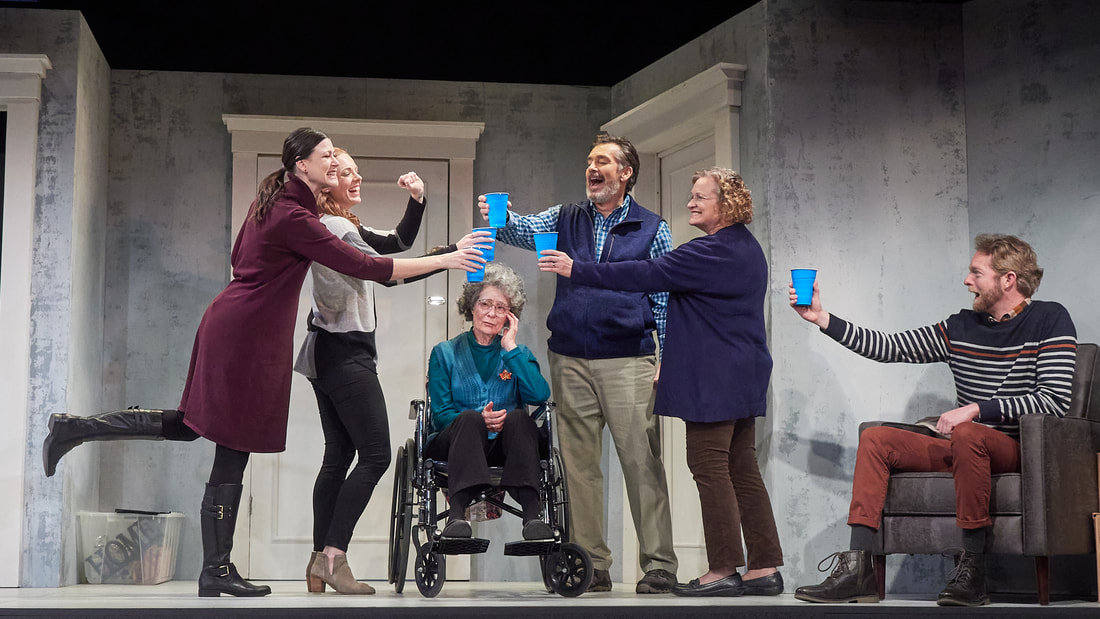|
Don't be fooled. This is not a happy Thanksgiving in "The Humans." Photo by Jim Carmody Meet the Blakes -- and brace yourself for a major depressive episode.
Father Erik is over-drinking, under-sleeping, having nightmares and harboring secrets. Mother Deirdre is fighting a losing battle with counting calories and is (barely) staving off weepiness. Daughter Aimee has been given the gate by her lover and is about to be given the same by her employer, a prestigious Philadelphia law firm. She also is suffering from ulcerative colitis and is facing surgery. Daughter Brigid can't find work as an artist and is being paid under the table to tend bar so she can collect unemployment. She's cohabitating in an unsettlingly noisy (mysterious sounds!) basement duplex in the Big Apple's Chinatown with Richard, a 38-year-old graduate student two years away from collecting a richly sustainable legacy. And grandma Fiona, aka "Momo," has slipped irrevocably into dementia. In Stephen Karam's tense but deadening "The Humans," this physically and psychologically ailing entourage assembles for Thanksgiving at Brigid's and Richard's apartment. No ordinary Thanksgiving dinner will ensue. Of course, is there ever in any household an ordinary Thanksgiving? The one depicted in "The Humans," onstage at the San Diego Rep's Lyceum Theatre under the direction of Todd Salovey, starts out ordinary enough: the prototypical family bickering, teasing, squabbling, at-the-table tensions, intended and unintended revelations and resentments. But perhaps two-thirds of the way through this 95-minute drama, "The Humans"' Thanksgiving evening becomes most extraordinary. Existential? Yes. Extrasensory? Getting closer. Supernatural? Could be. Playwright Karam seemingly crafted the foundation of the play as if he'd placed a hidden microphone inside the house where a non-Norman Rockwellian Thanksgiving gathering were taking place. Anyone will recognize a moment -- or many moments -- that sound exactly like theirs on such an almost traditionally uncomfortable occasion. At the outset, this makes for a somewhat slogging beginning, as if we're obliged to eavesdrop more than observe and absorb. But Karam's characters, incredibly self-indulgent though they may be (except for poor afflicted "Momo"), are animated and unignorable even in their acute sufferings. This is due in great degree to the Rep's cast. Jeffrey Meek is wrenching (more and more so as the denouement approaches) as patriarch Erik Blake, with Elizabeth Dennehy aptly unnerved as Deirdre and Kate Rose Reynolds tough but tormented as Brigid. The most human of "The Humans" is Amanda Sitton, whose aching honesty elicits true sympathy for the unlucky and unhappy Aimee. These superior performances, though, aren't able to wholly compensate for a script that is endeavoring to accomplish far too much. Karam has said that he started out writing a thriller that became a family drama, rather than the other way around -- which is what seems to have happened here. Either way, the thriller/chiller/whatever atmospherics of "The Humans" don't ring true to me at all. The dark and relatable realities of these family members always seem more credible than the sound and lighting effects and deliberate allusions to death and desperation and the fateful morning of Sept. 11, 2001. The humans in "The Humans" are by and large tortured people, though they have each other. Yet they wallow, and the story turns to SFX and delusions of deeper significance along the way to a numbing conclusion. "The Humans" runs through Feb. 2 at the San Diego Repertory Theatre's Lyceum Theatre, downtown.
0 Comments
Leave a Reply. |
AuthorDavid L. Coddon is a Southern California theater critic. Archives
July 2024
Categories |
David Coddon |
|
